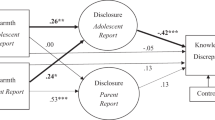Abstract
Parental monitoring is defined as a set of behaviors used to gain knowledge about an adolescent’s whereabouts, friends and associates, and activities. However, can knowledge of adolescents’ whereabouts/activities, and friends all be attained through the same strategies? Or do they require their own strategies? This study used qualitative interviews with 173 parents of older adolescents from 100 families. Emergent themes described strategies by which parents gain information about their adolescents’ friends and the substance use of those friends. The strategies included direct interaction with the friend, gaining information from the teen, using second-hand sources, and making assumptions. Some of these strategies were consistent with previous research, while others raise new questions and provide interesting new directions to pursue. Primarily, additional consideration needs to be given to assessments of parental monitoring that include strategies for gaining knowledge of adolescents’ friends and their substance use.
Similar content being viewed by others
References
Allen, M., Donohue, W. A., Griffin, A., Ryan, D., & Turner, M. M. M. (2003). Comparing the influence of parents and peers on the choice to use drugs: A meta-analytic summary of the literature. Criminal Justice and Behavior, 30(2), 163–186.
Belendiuk, K. A., Molina, B. S. G., & Donovan, J. E. (2010). Concordance of adolescent reports of friend alcohol use, smoking, and deviant behavior as predicted by quality of relationship and demographic variables (JSAD 71: 253). Journal of Studies of Alcohol and Drugs, 71(2), 253.
Bogenschneider, K., Wu, M. Y., Raffaelli, M., & Tsay, J. C. (1998a). Parent influences on adolescent peer orientation and substance use: The interface of parenting practices and values. Child Development, 69(6), 1672–1688.
Bogenschneider, K., Wu, M., Raffaelli, M., & Tsay, J. C. (1998b). “Other teens drink, but not my kid”: Does parental awareness of adolescent alcohol use protect adolescents from risky consequences? Journal of Marriage and the Family, 60(2), 356–373.
Bumpus, M. F., & Rodgers, K. B. (2009). Parental knowledge and its sources: Examining the moderating roles of family structure and race. Journal of Family Issues, 30(10), 1356–1378.
Crouter, A. C., Bumpus, M. F., Davis, K. D., & McHale, S. M. (2005). How do parents learn about adolescents’ experiences? Implications for parental knowledge and adolescent risky behavior. Child Development, 76(4), 869–883.
Feiring, C., & Lewis, M. (1993). Do mothers know their teenagers’ friends? Implications for individuation in early adolescence. Journal of Youth and Adolescence, 22(4), 337–354.
Fulkerson, J., Pasch, K., Perry, C., & Komro, K. (2008). Relationships between alcohol-related informal social control, parental monitoring and adolescent problem behaviors among racially diverse urban youth. Journal of Community Health, 33(6), 425–433.
Guilamo-Ramos, V., Jacard, J., Turrisi, R., Johansson, M., & Bouris, A. (2006). Maternal perceptions of alcohol use by adolescents who drink alcohol. Journal of Studies on Alcohol and Drugs, 67(5), 730–737.
Hawkins, J. D., Catalano, R. F., & Miller, J. Y. (1992). Risk and protective factors for alcohol and other drug problems in adolescence and early adulthood: Implications for substance abuse prevention. Psychological Bulletin, 112(1), 64–105.
Kerr, M., & Stattin, H. (2000). What parents know, how they know it, and several forms of adolescent adjustment: Further support for a reinterpretation of monitoring. Developmental Psychology, 36(3), 366–380.
Kerr, M., Stattin, H., & Burk, J. W. (2010). A reinterpretation of parental monitoring in longitudinal perspective. Journal of Research on Adolescence, 20(1), 39–64.
Lahey, B., Van Hulle, C., D’Onofrio, B., Rodgers, J., & Waldman, I. (2008). Is parental knowledge of their adolescent offspring’s whereabouts and peer associations spuriously associated with offspring delinquency? Journal of Abnormal Child Psychology, 36(6), 807–823.
Laird, R. D., Pettit, G. S., Dodge, K. A., & Bates, J. E. (2003). Change in parents’ monitoring knowledge: Links with parenting, relationship quality, adolescent beliefs, and antisocial behavior. Social Development, 12(3), 401–419.
Muhr, T. (2006). ATLAS.ti, version 5.2. Berlin: Scientific Software Development.
National Institute on Drug Abuse. (2002). Risk and protective factors in drug abuse prevention. NIDA Notes: Drug Abuse Prevention Research Update, 16(6).
Padilla-Walker, L., Nelson, L., Madsen, S., & Barry, C. (2008). The role of perceived parental knowledge on emerging adults’ risk behaviors. Journal of Youth and Adolescence, 37(7), 847–859.
Ryan, G. W., & Bernard, H. R. (2003). Techniques to identify themes. Field Methods, 15(1), 85–109.
Stattin, H., & Kerr, M. (2000). Parental monitoring: A reinterpretation. Child Development, 71(4), 1072.
Steinberg, L., Fletcher, A., & Darling, N. (1994). Parental monitoring and peer influences on adolescent substance use. Pediatrics, 93(6), 1060–1064.
Tilton-Weaver, L. C., & Galambos, N. L. (2003). Adolescents’ characteristics and parents’ beliefs as predictors of parents’ peer management behaviors. Journal of Research on Adolescence, 13(3), 269.
Tilton-Weaver, L. C., & Marshall, S. K. (2008). Adolescents’ agency in information management. In M. Kerr, H. K. Stattin, & R. C. M. E. Engels (Eds.), What can parents do? New insights into the role of parents in adolescent problem behavior (pp. 11–41). Chichester, UK: John Wiley & Sons, Ltd.
Updegraff, K. A., Kim, J.-Y., Killoren, S. E., & Thayer, S. M. (2010). Mexican American parents’ involvement in adolescents’ peer relationships: Exploring the role of culture and adolescents’ peer experiences. Journal of Research on Adolescence, 20(1), 65–87.
Updegraff, K. A., McHale, S. G., Grouter, A. C., & Kupanoff, K. (2001). Parents’ involvement in adolescents’ peer relationships: A comparison of mothers’ and fathers’ roles. Journal of Marriage & Family, 63(3), 655.
Wood, M. D., Read, J. P., Mitchell, R. E., & Brand, N. H. (2004). Do parents still matter? Parent and peer influences on alcohol involvement among recent high school graduates. Psychology of Addictive Behaviors, 18(1), 19–30.
Author information
Authors and Affiliations
Corresponding author
Rights and permissions
About this article
Cite this article
Bourdeau, B., Miller, B.A., Duke, M.R. et al. Parental Strategies for Knowledge of Adolescents’ Friends: Distinct from Monitoring?. J Child Fam Stud 20, 814–821 (2011). https://doi.org/10.1007/s10826-011-9449-0
Published:
Issue Date:
DOI: https://doi.org/10.1007/s10826-011-9449-0




